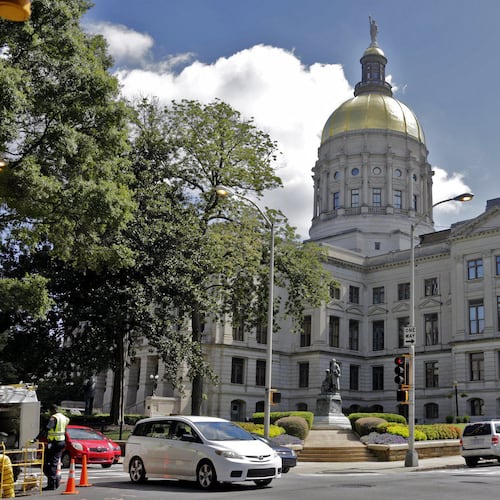Federal regulators filed a complaint Thursday seeking the seizure of Georgia lender First Liberty Building & Loan, accusing the financial institution that has deep conservative political ties of operating a sweeping $140 million Ponzi scheme.
In a lawsuit, the U.S. Securities and Exchange Commission alleged Newnan-based First Liberty defrauded investors across the country with false promises of lofty returns, only to use incoming investor funds to repay existing investors.
“The promise of a high rate of return on an investment is a red flag that should make all potential investors think twice or maybe even three times before investing their money,” said Justin C. Jeffries, of the Securities and Exchange Commission’s Atlanta office.
“Unfortunately, we’ve seen this movie before — bad actors luring investors with promises of seemingly over-generous returns. And it does not end well.”
The complaint alleges that First Liberty founder Brant Frost IV misappropriated investor funds, making payments to himself and relatives of more than $5 million, and using other funds for operations of several affiliated companies, which were also named as defendants in the suit.
The SEC said Frost used investor money to make more than $2.4 million in credit card payments, another $335,000 to a rare coin dealer, $230,000 on family vacations at a rental home in Maine and $20,800 for a Patek Philippe watch.
Frost also allegedly used investor money to make more than $570,000 in political donations, the SEC alleges.
Brant Frost IV said in a statement to The Atlanta Journal-Constitution that he would like to “apologize personally to those I have harmed” but is restricted from doing so.
“I take full responsibility for my actions and am resolved to spend the rest of my life trying to repay as much as I can to the many people I misled and let down,” he said.
“I will be cooperating with the receiver and federal authorities and ask that everyone allow the receiver time to sort things out and do his best to repair the damage I created.”
The fallout
Brant Frost IV and his children were deeply embedded in grassroots conservative politics in Georgia, with roles in the state party and also a far-right faction that has pushed to ban some Republicans candidates from the party’s ballot.
A federal judge on Friday appointed S. Gregory Hays as a receiver to manage the affairs of First Liberty and several related companies and also ordered a freeze of First Liberty’s assets to try to recoup money for investors. The SEC said Frost and the companies, without admitting or denying the allegations, consented to the SEC taking over the companies.
First Liberty announced June 27 it had ceased all business operations and said that it is “cooperating with federal authorities as part of an effort to accomplish an orderly wind-up of the business.”
Other company executives have not returned repeated messages seeking comment. Brant Frost IV is the only individual named as a defendant.
The closure sent shock waves through Republican political circles and sent investors clamoring for information about their money.
The company aggressively marketed its products, including business loans and investment opportunities, across conservative media in Georgia and beyond. The company was also a frequent advertiser on Atlanta Braves radio broadcasts.
Promotional materials highlighted appearances on the “Hugh Hewitt Show” and advertisements on the “Erick Erickson Show.” The lender billed its leaders as “authentic followers of Christ” with a penchant for charitable giving to religious causes. Its slogan: “We say yes when the big banks say no.”
Brant Frost V, the founder’s son and a company principal, often promoted the firm on conservative programs as a way for everyday investors to grow the “patriot economy.”
With “Building & Loan” in its name, First Liberty evoked the film classic “It’s A Wonderful Life” but First Liberty was not a bank, did not take deposits and was not insured by the Federal Deposit Insurance Corp.
One of the products First Liberty insiders marketed in advertisements and conservative media appearances were “First Liberty Notes.”
Credit: Screenshot
Credit: Screenshot
These were touted as ways to buy pieces of short-term and bridge loans offered to First Liberty’s business borrowers and they offered high interest rates in return.
The SEC said First Liberty executives told investors that very few of these loans had defaulted and that they would be repaid by borrowers through Small Business Administration or other commercial loans.
But while some investors funds were used to make bridge loans, the SEC said in its complaint, most of the loans ultimately defaulted and ceased making interest payments.
“Since at least 2021, First Liberty operated as a Ponzi scheme by using new investor funds to make principal and interest payments to existing investors,” regulators said.
Since 2021, 80% of interest and principal payments from loans paid to investors came from new investor funds, not from borrowers repaying loans, the SEC contends. The SEC said potentially 90% of loans First Liberty issued are in default.
At times, the elder Frost told investors First Liberty would repay them if the borrowers defaulted, the SEC contends.
Richard Hortman, one First Liberty investor, told the AJC he was warned his investment, which totaled $275,000, could come with risk. But he said Brant Frost IV assured him “they’d never lost any money for any of their investors.”
“I’m out about a third of the money I spent 50 years saving,” said Hortman, who made his initial investment with First Liberty earlier this year.
As recently as June, the SEC said Brant Frost IV was soliciting participations in a $3.5 million loan and was telling prospects that First Liberty had more than enough money to repay the loan if necessary, something the regulator said was untrue. As of May 30, First Liberty only had about $2.7 million in its accounts.
The elder Frost, 67, made a personal apology to some investors in recent days, reading from a prepared statement that said he was apologizing for his role and that federal authorities were shutting down his business, according to two people with direct knowledge of the conversations who spoke on the condition of anonymity.
Political connections
The elder Frost was deeply connected in Georgia politics and so too were his kids. His son, Brant Frost V, is a former vice-chair of the state party and longtime chair of the Coweta GOP; his daughter, Katie Frost, heads the state GOP’s 3rd District committee.
Until a recent rift, the Frost children were active in the Georgia Republican Assembly, a far-right faction that pushes for local party leaders to have the final say over which candidates can qualify as Republicans.
Craig Kuglar, an Atlanta lawyer who has represented victims of other Ponzi schemes, said he has been contacted by First Liberty investors across the country.
The receiver appointed by the SEC will attempt to get to the bottom of the company’s financial distress, help piece together what happened and try to preserve as much value as possible for investors, Kuglar said.
Lawyers like Kuglar attempt to determine if any third parties might be liable and could be sources for investors to recoup at least some of their losses.
Credit: arvin.temkar@ajc.com
Credit: arvin.temkar@ajc.com
“Many of these Ponzi schemes are geared toward retirees counting on a steady stream of income,” he said. For some, the economic damage can be destructive.
“Investors should not beat themselves up,” Kuglar said. “These frauds hit the most sophisticated and intelligent investors out there. The people who run them are really good at telling you what you need to know or what’s believable.”
Ponzi schemes often grow based upon an affinity, such as political beliefs, religion or ethnic backgrounds.
Kuglar said First Liberty’s outreach hit on themes that fed into beliefs of many of its clients, including a conservative world view, Christian faith and a distrust of Wall Street.
“That’s why these are so successful because they come from a place of trust,” he said.
Keep Reading
The Latest
Featured






